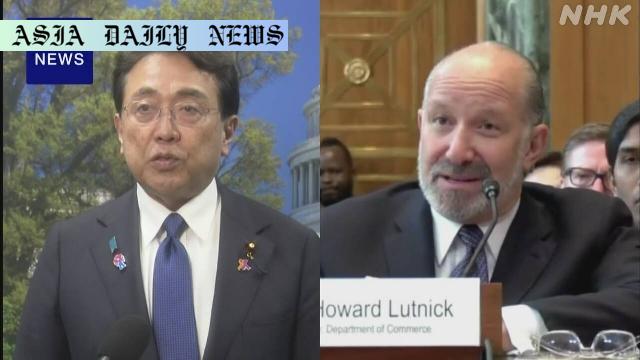Trade Negotiations: Japanese and US officials pledge closer coordination on tariff measures and economic cooperation for growth.
Japanese Economic Revitalization Minister Akazawa Ryosei and US Commerce Secretary Howard Lutnick held two phone talks during Akazawa’s US trip.
The discussions focused on tariffs, trade agreements, non-tariff measures, and economic security cooperation.
Both officials pledged to continue vigorous coordination for a mutually beneficial trade agreement.

Japan-US Trade Negotiations: A New Era of Economic Dialogue
In a recent flurry of discussions, Japanese Economic Revitalization Minister Akazawa Ryosei and US Commerce Secretary Howard Lutnick engaged in a series of talks aimed at reshaping the framework of their bilateral trade relationship. Over a span of a few days, these deliberations saw multiple phone calls and in-person meetings, underscoring the urgency and importance of the issues on the table. The key topics of discussion included reassessing US tariff measures, exploring avenues for trade expansion, addressing non-tariff barriers, and strengthening cooperation on economic security.
The intensity of the discussions reflects the high stakes involved in the economic partnership between the two nations. Japan and the United States have long been indispensable trade partners, historically contributing to each other’s economic growth. However, new global economic dynamics – including shifts in supply chain demands, fluctuating tariffs, and geopolitical pressures – have necessitated a reassessment of their trade agreements. Akazawa’s decision to extend his US visit highlights the eagerness to achieve significant progress in building a framework that benefits both nations equitably.
Tariff Measures and Economic Security: Points of Contention
One of the central focuses of the discussions was the contentious issue of US tariff measures. These measures have shaped global commerce trends and continue to be a significant point of contention between trading partners. Both Akazawa and Lutnick are aware that resolving tariff concerns could be the linchpin for building a mutually beneficial agreement. The talks emphasized balancing protectionist measures with fostering open and fair trade practices to support domestic industries while respecting international obligations.
Beyond traditional trade parameters, economic security also emerged as a pivotal theme. With increasing vulnerabilities in global supply chains and the prevalence of cyber threats, both nations underscored the importance of cohesive strategies to mitigate risks. Their discussions likely addressed key technological partnerships and the fortification of critical infrastructure against breaches, ensuring a robust and resilient economic ecosystem. This reflects an understanding that economic security is no longer confined to national boundaries but is a shared responsibility between allied nations.
A New Path Forward: Strengthening Bilateral Collaboration
What makes this round of negotiations significant is the shared commitment voiced by both Japanese and US representatives to pursue solutions vigorously. Both Akazawa and Lutnick’s resolve to continue dialogues lays the groundwork for substantive progress in the months ahead. The emphasis has been placed on creating a nuanced agreement that not only addresses immediate concerns like tariffs but also lays the foundation for broader, long-term collaboration.
The unprecedented global challenges of recent years – from the COVID-19 pandemic to ongoing geopolitical tensions – have disrupted traditional trade ecosystems, making these negotiations timelier than ever. By prioritizing mutual growth, both nations are setting an example for how allies can navigate these global complexities through dialogue and cooperation. Akazawa’s decision to postpone his return to Japan symbolizes the dedication and effort both sides are investing in securing a comprehensive agreement.
The Road Ahead: Challenges and Opportunities
While these discussions show promising signs, several challenges remain. For one, aligning the two countries’ priorities will require significant compromise and adaptability. Japan and the United States face different domestic pressures, economic landscapes, and stakeholder interests, all of which can influence the outcomes of these negotiations. Maintaining openness and a commitment to mutual benefits will be crucial in overcoming these hurdles.
At the same time, the opportunities that stem from strengthened US-Japan trade relations are immense. From advancing technological innovation to fostering economic resilience, these negotiations could catalyze transformative developments in both countries. As such, these talks mark a pivotal moment not just for the two nations involved but also for the broader global trade community, demonstrating the potential of collaborative problem-solving on the international stage.
Commentary
The Global Significance of Japan-US Trade Talks
The recent Japan-US trade negotiations highlight the crucial role that bilateral partnerships play in navigating the complexities of the modern global economy. These discussions exemplify how two major economic powers can come together to address challenges that resonate far beyond their national borders. For instance, resolving disputes over tariffs could set an example for other allied nations grappling with similar trade issues.
Why Economic Security Stands Out
One of the standout aspects of these talks is the emphasis on economic security. In an era where economic vulnerabilities can lead to wide-reaching consequences – from supply chain disruptions to cyberattacks – it’s refreshing to see both Japan and the United States viewing these issues through a collaborative lens. By prioritizing economic security, these nations are not just addressing current weaknesses but also future-proofing their economic infrastructure. This cooperative approach could serve as a model for others, showcasing the importance of shared responsibility in an interconnected world.
The Importance of Continued Dialogue
Another facet worth appreciating is the commitment to sustained dialogue. Negotiations like these are seldom straightforward, as they involve balancing numerous, sometimes conflicting, interests. However, the willingness demonstrated by Akazawa and Lutnick to extend talks and explore additional discussions reflects a deep understanding of the stakes involved. Such dedication is remarkable in a global climate often marked by divisive politics and short-term solutions.
Conclusion: A Promising Outlook
Ultimately, my interpretation of these negotiations is one of optimism. While challenges undoubtedly remain, the shared commitment to progress and mutual benefit is a powerful force that bodes well for future outcomes. These talks are a testament to the importance of alliances built on trust, dialogue, and a shared vision for economic prosperity. They remind us all that even amid uncertainty, constructive engagement remains a cornerstone of global progress.


